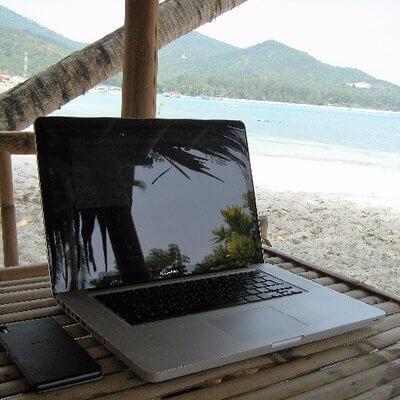Do you have tips for saving money while working remotely?
My Keurig has saved me so much money from my daily Starbucks trips.
Working remotely in and of itself saves a lot of money. I spend so much less on lunches out, gas, clothes for work, car maintenance, etc. Try to avoid eating out during lunch as much as you can—it really adds up.
I prefer not to focus on saving money… I prefer to focus on making more…
I eat at home for lunch nearly every day, whereas when I was in a traditional office setting, I’d go out to lunch on a fairly regular basis. That’s definitely a big savings.
Things like paper and toner should be purchased by the case when possible. I use generic toner cartridges from Amazon.com that cost under $2 each for my HP printer. It’s only for me and saves a ton of money as I tend to like to print documents to mark up.
Focus on what’s most vital and get really nice versions of those things, but eschew the superfluous. So if a laptop and phone are two really important things for doing your work well, get a great laptop and a great phone. But maybe don’t invest in a great big TV or expensive couch. Spend your money where it does the most good and where it will fulfill you the most.
This is a massive subject, really, but when people ask me about this I always come back to this: Slow travel. Traveling slowly, finding places to stay put in for weeks or months, can save you a whole lot of money. Just getting to know a place well is going to help you avoid wasting money, and you can also get much better deals on accommodation and coworking places if you stay for weeks or months instead of days. You’ll probably also save time and work more effectively than if you’re constantly on the go from place to place, which for most of us of course translates to more money in the bank.
I use to order lots of takeout at my non-remote jobs because I was in a rush and never prioritized packing a lunch (or grocery shopping for that matter!). Now I am saving lots of money by eating breakfast and lunch at home most days. The time I got back from my commute and general office shenanigans went into organizing my life—including finding time to cook!
Yes—work remotely. Don’t drive to work, buy expensive work clothes, buy expensive coffee or lunches. I tend not to worry too much about heating (and it gets very cold here), I just throw layers of clothes on. I’ve always considered working from home to be very economical compared to working in an office. My shoes don’t wear out either (did I mention the blisters though?).
Working remotely is automatically a money saver! I go to the dry cleaners about twice a year. I eat lunch at home. I make my own coffee.
There are plenty of articles out there about geoarbitrage and choosing places that are cheap to work from. There are always places you can live in that aren’t expensive, but it’s also important to figure out if they meet your needs in other ways, such as community, food (for me this is really important), safety, and internet.
I think as not working remotely tips are the same: don’t spend beyond your means, think about the ways that you can budget more effectively, and consider owning less stuff.
Traveling while working remotely can be cheaper in some places, although it’s easy to rack up expenses if you’re not careful. Some people think that you’re suddenly going to save on so many things, but throw in an average of one plane ticket every month, a few mid-priced hotels, and many of your fixed costs might remain the same (office space, health insurance, savings, retirement, etc.). You can stay, work, and eat cheaply, but you have to be resourceful. Find local friends, stay in local places (not just hotels or Airbnbs), and invest the time in finding ways to make your experience more enjoyable without breaking the bank and paying convenience premiums that regular short-term travelers may pay.
Telecommuting itself saves money on gas, car wear and tear, mileage, and parking. You can also streamline wardrobes, considering you are not required to “dress up” every day.
The biggest money-saving tip is to make meals at home or buy groceries and snacks if you’re on the road.
My partner and I eat breakfast, lunch, and dinner at home almost five days a week. On Sunday we visit the market and ensure we have what we need for the week, which saves time to whip up quick meals. We also invested in a good coffee machine so we limit our trips to the local cafe. Coffee prices can easily add up.
Without a daily commute, you may be able to cut down on an extra car. Some companies may offer reimbursements for a utility like home Internet service.
Digital Nomads: Get into house-sitting (we haven’t paid rent since 2011, and we’ve only paid for 25 hotel room nights since December 2013). When your monthly burn is less than $250/person, you can truly focus on that work-life balance.
In a foreign country it’s easy to feel like you’re on vacation and spend money without thinking, especially if your home currency is much stronger. Keep track of your expenses. At home, I use Mint and have all my bank cards connected to it. In Asia I’ve mostly been using cash, so I’ve been manually inputting all my expenses into the Trail Wallet iOS app.
You can save money on accommodation by house sitting (which I haven’t tried), or by doing WorkAways (which I have). The latter was introduced to me by a South American yoga teacher in Laos. She was teaching yoga and doing graphic design for a really nice resort in Vang Vieng in exchange for accommodation and breakfast (hotel buffet breakfast!). I taught English once, and did marketing and built websites other times.
Easy! Make your own coffee. ^_^ And remember that for a lot of the bigger expenses like coworking rent, a computer, Wi-Fi, travel, etc., it’s likely your company will chip in.
I use three bank accounts to distribute my salary and keep track of spending. One account is for savings/emergency, one account is for travel, and one account is for withdrawing money for standard monthly expenses.
Splitting your time between costly cities and affordable locations is an effective method to combine remote work and travel. Many call this geoarbitrage, but it involves making money in a strong currency and spending it in places where your income travels further for every dollar spent. In this way, you can travel and work remotely for far less money than it costs to live in most U.S. cities.
Maintaining a healthy diet and keeping a schedule are huge in terms of money management. It’s easy to mindlessly order takeout frequently if you don’t have scheduled breaks or you didn’t budget time for grocery shopping. Utilize libraries and coffee shops as they’ll cut down on your utility bills.
I don’t want PR people having my cell phone number, so I use Skype instead of a traditional landline for business purposes—even if you pay for a number and the ability to call landlines, it’s still less expensive than a landline.
Not commuting and having a home office (with the home office tax deduction) can both save you real money (and time). So can eating lunch at home but I like to go to cheap places in my neighborhood for lunch these days. It serves as a nice break.






















